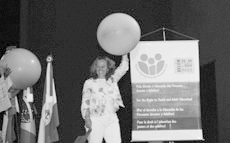Sofía Valdivielso
Sofia Validvielso is a member of the Gender and Education Office (GEO) of the ICAE. It was formed in 1997 within the context of CONFINTEA V by women’s organisations and networks in order to promote the educational dimension for youth and adults as a strategic element for achieving justice and equality in gender relations. She also demands: “let’s turn to action”.
The Right to Lifelong Education – Is Education also in Crisis?
Proposals and Challenges for another Possible World
Since its beginning, the United Nations have expressed their conviction that education is one of the basic pillars on which modern societies should lean.
Over the last six decades, UNESCO has organized five international conferences expressly devoted to Adult Education. Great progress towards the comprehension of the universal right to lifelong education were performed in each one of them.
If we read carefully each one of the texts elaborated in these conferences, we will conclude that we are the heirs to the discourses and debates created during these six last decades, that central ideas regarding the right to Young and Adult Education are already said and that, as the slogan for the next conference in Belém states, it’s time for action.
Let’s remember: in Elsinor (1949) we debated on the role that AE should play regarding the comprehensive development of the people and the strengthening of positive relations among them. In Montreal (1960) we focused the debate on the necessity that all countries in the world should learn to coexist in peace. Learning becomes the key word in this event. In Tokyo (1972) we discussed, for the first time, the problems of the deterioration of the environment, a consequence of the uncontrolled development of the previous decade. Besides, the presence of new States makes it easier to become aware of the need to introduce into the agenda the subject of diversity and respect of other cultures. In Paris (1985) we approved a statement on the right to learn. We insisted on the fact that this right to learn does not have to be understood only from its functional dimension as a tool of economic development but mainly as a universal human right; in asserting this right human beings become the main characters responsible of their own history.

Sofia Valdivielso
Source: Claudia Ferreira
Finally, in Hamburg (1997) a new discourse arises, for some people a new paradigm, focused on the search for new ways of integration of those perspectives expressed as opposed in Paris. We face the beginning of a more inclusive vision of Adult Education, understanding it as a part of a process that embraces the whole life, which goals aim to promote persons and communities’ learning, the dialogue among the different cultures, respecting diversity and cultural differences. In Hamburg we reaffirmed that development is at the service of the human being and not the other way round, and we considered that educational systems must be created from a Lifelong Learning perspective and must also ensure that Adult Education contributes to the development of democracy, justice and equity, to sustainable development, to people and societies’ empowerment, to face transformations and changes affecting economy, culture and society as a whole, and to the establishment of an intercultural dialogue addressed to the development of a culture of peace.
Today, with a perspective of more than half a century of history, we can affirm that even if we have travelled a long way, we still have much ahead before we can say that this is a universal right. We have turned from a view in which the world appears as rational machinery that works properly, that follows natural laws that can be learned, controlled and manipulated to its own profit, into a view of the world focused on plurality, on the community, on the relation among human beings, on the networks and on ecological sensitivity.
In Belém we should go ahead and lay the foundations for the emergence of a new view of the world that, without denying the previous ones, should go beyond them and help us understand that life, besides being plural and diverse, is one; that differences and pluralities can be naturally integrated into interdependent trends. The present crisis is accelerating the processes of understanding that it is better to cooperate than to compete and that, as Einstein said, this will be one world or none. Let’s turn to action!


